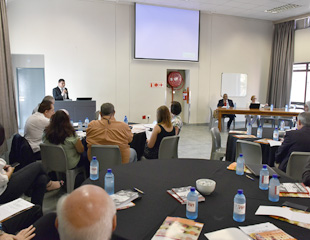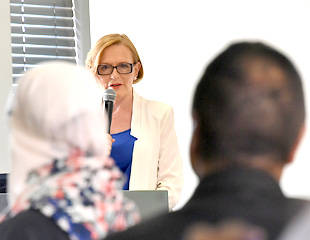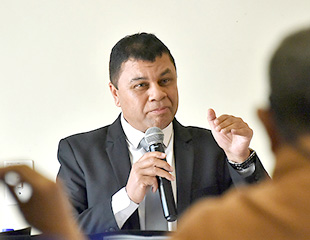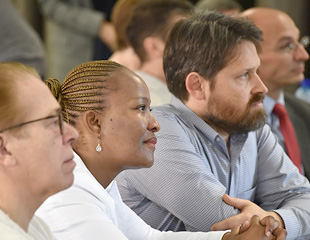Outline

SACCPS held its annual conference on 10-11 February 2020 at the University of the Free State, South Africa. The conference was jointly hosted by the Department of Political Studies and Governance and the Centre for Africa Studies at the University of the Free State and the Osaka School of International Public Policy (OSIPP), Osaka University. In keeping with tradition, it focused on South Africa, southern Africa, and the African continent at large, as well as viewing connections between Africa and the outside world.

Photos courtesy of the University of the Free State
SACCPS Conference 2020 program
Day 1: South Africa – Prevaricating at the Precipice?

Welcome
Prof Francis Petersen, Vice-Chancellor and Rector, UFS
Session 1: Setting the Scenee
- The State of South Africa
Helen Zille, Chairperson of the Democratic Alliance’s Federal Council
- The State of South Africa’s Politics
Roland Henwood, Department of Political Sciences, University of Pretoria
- The State of the African National Congress
Dirk Kotze, Department of Political Sciences, University of South Africa
- The State of the Democratic Alliance
Dirk Kotze, Department of Political Sciences, University Bonolo Selebano, Journalist, Media 24
Session 2: Issues in South African Foreign Policy
- South Africa’s Africa Agenda: A Mea Culpa to the Continent?
Bianca Naude, Department of Political Studies and Governance, UFS Qwa Qwa campus
- South Africa and the UN Security Council
Sithembile Mbete, Department of Political Science, University of Pretoria
- The State of Diplomacy in South Africa
Costa Georghio, University of Johannesburg
- The Return of the Cargo Cult: The Emerging Foreign Policy Matrix of Cyril Ramaphosa,
Chris Landsberg, University of Johannesburg
Session 3: Economic, Political and Security Considerations
- The State of South Africa’s Economy
Philippe Burger, Pro-Vice Chancellor and Deputy Dean: Economic and Management Sciences, UFS
- The State of SOEs in South Africa
Kagiso Molefe, Department of Economics, UFS
- Our people – How are They? An Overview of Global and Local Statistics, Indicators and Indices
Doris Viljoen, Institute for Futures Research, Stellenbosch University
- Land Reform: What We’re Doing Wrong and How we Can do it Right
Terence Corrigan, South African Institute of Race Relations
- Civil-Military Relations in South Africa
Abel Esterhuyse, Faculty of Military Science, University of Stellenbosch
Session 4: Local Government Politics
- Re-Assessing and Redirecting Governance in Gauteng
Isaac Mashaba, Author of Practical Politics, Power and Governance
- Governance Leadership: A conceptual framework
Tania Coetzee, Programme Director: Governance and Political Transformation, UFS
- The Informal Waste Economy and its untapped potential in Local Government: A Case study of Waste Pickers in the Mangaung Metropolitan Municipality
Mosa Mofokeng and Mr. Ambrose du Plessis, Department of Public Administration and Management, UFS
Day 2: Africa – Prevaricating at the Precipice?

- Russia’s New Footprint in Africa: Policy: Pushing Strategic Energy Diplomacy and Selling Military Equipment
Theo Neethling, Department of Political Studies and Governance, UFS
- Maritime Security Governance and Capacity Building off Africa
Francois Vrey, Security Institute for Governance and Leadership in Africa (SIGLA), Stellenbosch University
- International Actors and Africa: Strategic Considerations
Eeben Barlow, Chairman STTEP
- The Significance of Sino-African Academic and Cultural Exchanges: Prospects for the Future
Fanie Herman, Research Fellow, Department of Political Studies and Governance, UFS
Session 2: Reflecting about the African strategic landscape
- Understanding Lesotho’s Political-Security Discourse and its Historical and Contemporary Relevance
Mahlakeng Khosi Mahlakeng, Department of Political and Administrative Studies, National University of Lesotho
- Security Logics in Botswana’s Anti-Poaching Responses: The Case of Elephant Poaching
Gladys Mokhawa, University of Botswana
- The Challenges of Emerging Technologies: Africa and the World
Eben Coetzee, Department of Political Studies and Governance, UFS
- Whither Zimbabwe? Politics and Economy During the Second Republic
Clement Masakure, Department of History, UFS
- The Narco-Terrorism Nexus: The Cases of Afghanistan, Columbia and West Africa, Sam-Marie Rooi, Department of Political Studies and Governance, University of the Free State
Session 3: Africa: Perspectives from Japan
- Japan-Africa Relations
Masa Sugano, Chief Representative in Africa, Japanese Ministry of Economy, Trade and Industry
- Reflections on the Determinants of Media Coverage of Conflict in Africa
Virgil Hawkins, Osaka School of International Public Policy
- The Concept of `Kyosei’ and Co-existence in Africa
Steve Muller, School of Human Sciences, Osaka University
- Pragmatic Ties? A Review of Iran – South Africa Relations
Marzie Khalilian, Osaka School of International Public Policy
Closing Remarks, Theo Neethling and Virgil Hawkins
